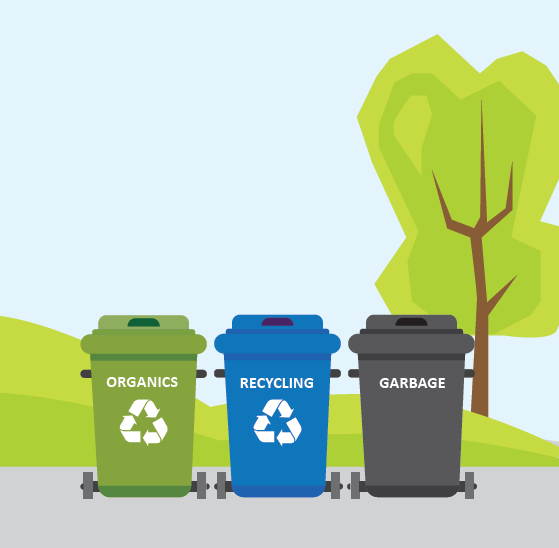Electoral Area Curbside Collection Consultation - We want to hear from you!
February 9, 2023
Nelson, BC: The Regional District of Central Kootenay (RDCK) is seeking the public’s feedback on a curbside collection service in certain parts of RDCK Electoral Areas. Households in Electoral Area’s D and K are not part of the service proposal due to their distance to RDCK waste disposal facilities for processing organic waste. From now until April 21, 2023, the RDCK’s Resource Recovery Department is holding a public consultation aimed at receiving input on a proposal to introduce curbside collection services for household waste (garbage, recycling and organic waste) to Electoral Area residents within potential service area boundaries. The RDCK will be utilizing an online engagement platform for the consultation to share information and encourage open discussion. Residents can view the consultation project and have their say at https://engage.rdck.ca/.
Residents within the potential service areas will receive or have already received an invitational postcard in the mail outlining the consultation process and are encouraged to sign up online and participate in the process to provide valuable feedback to the RDCK. The online platform allows residents to fill out surveys, ask questions to staff and receive publicly posted responses, review maps and project background information, as well as engage with other members of your community.
"The days of throwing everything we no longer want or need into a hole in the ground are long past,” said Garry Jackman, RDCK Electoral Area A Director. “Today, many speak of reaching the point of 'zero waste', but that shift is complex and will take many years. In the short term, the most practical, cost effective improvements to our waste management system involve diversion from landfills, through expanded recycling programs and through organics diversion to either backyard or centralized composting facilities."
In 2020 the RDCK conducted a feasibility study to identify Electoral Areas that could potentially receive services, and in 2021, completed a preliminary round of consultation to verify if residents of the Electoral Areas identified were interested in the idea. Now, with the construction of new organic waste processing facilities in the region, and draft regulation changes to increase options for how recycling is managed in rural areas, the RDCK is looking to confirm the interest of residents who would be eligible to receive services for all three streams of waste through further consultation.
Potential service area boundaries were developed using local geographic considerations, driving distance to facilities able to collect organic waste, household densities, and population densities. Maps of these potential service area boundaries can be viewed HERE on the RDCK curbside consultation project webpage.
The RDCK is also providing the option of completing the survey over the phone or by mail. To request either of these options, contact the RDCK’s Resource Recovery department at 250.352.1576 or by email RRdept@rdck.bc.ca.
The proposed cost of the service is $160 to $265 per household per year ($13.30 to $22 per month), which is based on other similar programs across BC. This cost is likely less than or similar to what an average family would pay in fuel, time, and disposal fees to self-haul their waste to a RDCK facility.
The results of the consultation will be made public by early summer. If the consultation indicates significant and widespread public support for the proposed curbside collection program, the RDCK may proceed to a referendum this fall which would give affected residents a final option to vote in favor or against the proposed service at a maximum cost of $265 per household per year.
“Not only would curbside collection service in Electoral Areas be more convenient for residents, it would save on countless trips to recycling depots, transfer stations and landfills, diminish long term landfill costs and reduce greenhouse gas emissions,” said Uli Wolf, RDCK General Manager, Environmental Services.
Diverting landfilled waste is a core component of the Resource Recovery Plan, which governs the RDCK’s waste management practices. Taking these steps now can help reach the goals set out in this plan: to effectively and quickly reduce local GHG emissions, and improve the sustainability of waste management in the region. Household organic waste (food waste and food soiled paper) on average makes up 35% of household garbage, while recyclable materials can account for up to 32%. The RDCK wants to make it easier for residents to keep these materials out of the landfills.
Curbside collection of waste in Electoral Areas is a major component of the broader RDCK Organic Waste Diversion Program. The development of an organics diversion program started in 2017 as part of the RDCKʼs Resource Recovery Plan. The RDCK has since received two grants, totaling over $3.7 million to kick start the program. In 2019, the RDCK received the Organics Infrastructure Program grant, jointly funded by the federal and provincial governments, which covers two- thirds of the eligible costs of design and construction of composting facilities in both Creston and Salmo. In 2019, the RDCK received a CleanBC Organics Infrastructure and Collection Program grant to contribute two-thirds of eligible costs for establishing curbside collection of organic waste in Castlegar, Creston, and for a potential curbside service in Electoral Areas. The RDCK was also successful in securing $535,000 from the Columbia Basin Trust Climate Resiliency Program to assist with education and communication for the organics diversion program and for bear-proofing measures, such as bear-resistant lids for electoral area residents should the curbside service proceed.
Click here to view a print-friendly PDF version.
The content on this page was last updated February 9 2023 at 3:34 AM

